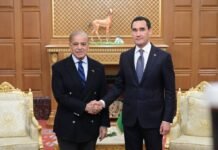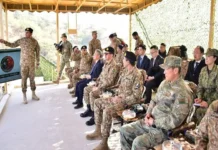Mirsaid Rahmonov
In the beginning of independence, the countries of Central Asia established good relations with the South Asian region. The region plays a strategic role in solving various problems of the world by having connections and connections of writers and scientists, literature, culture, language, and history, abundant natural potential in the region, and constructive initiatives.
Tajikistan is the only country in Central Asia that has close geographical ties with Pakistan, and diplomatic relations between both states were established on June 6, 1992, accordingly.
The Embassy of the Islamic Republic of Pakistan was opened in Dushanbe for the first time in 1993, and its official activity began in early 1994.
Sources show that the President of Tajikistan Emomali Rahmon visited Pakistan for the first time in 1994 and later visited it several times to participate in official meetings and ceremonies.
Recently Tajikistan’s President paid a visit to Pakistan at the invitation of Pakistan’s Prime Minister on December 14-15, 2022. He was welcomed by high-ranking state representatives, and Pakistani children during his arrival warmly.
Earlier, the President of Tajikistan visited Pakistan on June 2 and 3, 2021, and met with the Prime Minister, the President, and other top officials of the country.
As a result of this 12 documents of cooperation in various fields were signed between the two countries. It is worth noting that during the 11 months of 2020, the turnover between the two countries reached 16.2 million dollars.
The new statistical sources showed that in the last ten years, the trade exchange between the two countries has reached 100 million dollars, and the parties are trying to increase it to 500 million dollars consequently.
According to the official website of the Ministry of Foreign Affairs of Tajikistan, there is an intergovernmental commission on commercial, economic, scientific, and technical cooperation between the two countries, which is considered one of the main mechanisms for the development of bilateral economic cooperation.
Meanwhile, on July 2, 2019, the next meeting of the Joint Intergovernmental Commission of Tajikistan and Pakistan on commercial, economic, and technical cooperation was held in Dushanbe to discuss the important issues of cooperation.
It is worth noting that until the middle of the 6th month of 2021, the trade turnover between the two countries will gradually recover, increasing by 6.3% compared to last year and reaching 18.9 million US dollars.
The Ministries of Foreign Affairs of both countries strengthen and develop good diplomatic relations within the framework of agreements.
Pakistan and Tajikistan are active members of the UN, OIC, Shanghai Cooperation Organization, and Organization of Islamic Countries, additionally, both states play important roles in their own regional forums and associations such as SAARC, CICA, and CIS effectively.
According to various sources, more than 1.2 million people of Tajik origin live in this Pakistan, most of them have made it their permanent homeland since the time of the Mongol dynasty, engaging in trade, military, science and knowledge, architecture, religion, and mysticism.
Having past historical bounds Tajikistan and Pakistan can create an original energy route that is good for generating cooperation and developing regional integration, through which all countries will benefit from the wide resources of the region. The relations between Tajikistan and Pakistan provide a trade route between other regions too.
Pakistan is an agricultural country, its currency is the rupee, and its main exports are oil, leather, clothing, fabric, cotton, rice, food, and decorative goods. Imports include machinery and heavy products and chemical industry, transport equipment, fuels, and lubricants.
Good to mention that the first joint intergovernmental commission between Tajikistan and Pakistan was held in Islamabad in October 2002. During it, the relations between the two countries were discussed focusing on good use of the natural resources of Tajikistan and its wide electricity powers.
There are 8,000 glaciers in the region, and proper using of them can benefit the population of the region and the globe as well. Tajikistan has 4% of the world’s hydropower capacity and is the third largest producer of electricity in the world.
One of the other areas that bring Tajikistan and Pakistan closer is the implementation of the CASA-1000 project which the main initiators of it are Tajikistan, Kyrgyzstan, Afghanistan, and Pakistan.
It should be noted that the main goal of the CASA-1000 project is the generation and transmission of hydropower from Central Asia to the South Asia region.
The effective implementation of the project will help Pakistan to receive 1300 megawatts of electricity, reducing its electricity problems effectively.
Tajikistan and Pakistan can also develop and strengthen their cooperation in the field of agriculture and industry. Because both countries have good agricultural and industrial resources, such as growing potatoes, cotton, rice, fruits, matchmaking, cement, clothing, tableware, tube making, etc.
Tajikistan can use Pakistan’s experience and industry in the field of food and textile processing. The country ranks third in the production and processing of cotton products in the world.
On December 20, 2011, the first meeting of the Board of Trustees of the ECO Scientific Foundation was held in Pakistan and gathering all the member countries to discuss scientific issues.
Later on in March 2017, the heads of member states at their 13th Summit in the city of Islamabad, Pakistan, and all members discussed and approved the slogan “ECO Vision 2025”.
The leaders of both states also met and discussed several issues including peace and inclusive government in Afghanistan, ecology, economy, and trade during their meeting in Uzbekistan, Turkmenistan, Kazakhstan, Egypt, and Pakistan in 2022.
The leaders of both states once more discussed the bilateral relations as well as the situation in Afghanistan and called for the creation of a stable and inclusive democratic government.
Tajikistan also shared its grief and sorrow with the people of Pakistan sending two convoys of humanitarian aid to flood victims of the country, including convoys of vehicles carrying food, construction, sanitary products, and fuel in 2022.
It should be mentioned that in the earlier in the past, flights between the cities of Dushanbe and Karachi operated, generating the basis for the development of trade and commerce among both states.
Later in May 2016, Somon-Air launched the first flight of the Dushanbe-Lahore route, which laid the groundwork for the revival of relations between the two twin cities (Dushanbe and Lahore declared twin cities in 1973).
However, due to unclear geopolitical reasons, these flights did not continue regularly.
With the visit of the top leadership of the country, we hope that the flights will be restored and the airlines of both countries, including “Somon Air”, “Tojik Air”-Tajikistan and PIA of Pakistan, will be able to create good initiatives and foundations bringing the prosperity of the people of both countries.
It is good to mention that the duration of flights between Dushanbe-Islamabad, Dushanbe-Karachi, and Dushanbe-Lahore takes more than 90 minutes, 2 hours, and 1 hour and 30 minutes only.
It is worth mentioning that during the recent visit of the President of Tajikistan to Pakistan on December 14-15, 2022, a ceremony was held to sign new documents of cooperation between the two countries. The leaders of both countries signed the following documents of cooperation:
-A transit trade agreement between the Government of the Republic of Tajikistan and the Government of the Islamic Republic of Pakistan;
- Memorandum of understanding on establishing sister-city relations between the city of Dushanbe of the Republic of Tajikistan and the city of Islamabad of the Islamic Republic of Pakistan;
— Agreement between the Government of the Republic of Tajikistan and the Government of the Islamic Republic of Pakistan on cooperation in the field of industry and new technologies;
— Memorandum of understanding between the Customs Service under the Government of the Republic of Tajikistan and the Customs Service of the Islamic Republic of Pakistan on the organization of electronic data exchange;
— Agreement between the Agency for Standardization, Metrology and Trade Control under the Government of the Republic of Tajikistan and the Department of Standards and Quality Control of the Islamic Republic of Pakistan, the Ministry of Science and Technology of the Islamic Republic of Pakistan on cooperation in the field of standardization, metrology and conformity assessment;
— Agreement between the Government of the Republic of Tajikistan and the Government of the Islamic Republic of Pakistan on cooperation in the fight against illegal trafficking and abuse of narcotic drugs, psychotropic substances, and their precursors;
— Memorandum of understanding between the National Academy of Sciences of Tajikistan and the Water Resources Research Council of the Islamic Republic of Pakistan on cooperation in the field of basic research;
- A memorandum of understanding was signed between the National University of Tajikistan and the Peshawar University of the Islamic Republic of Pakistan.
In this context, it is suggested that the states should work together and solve the issues using the following formula by me as a module of peace, prosperity, and productivity for better cooperation and regional integration.
The formula is derived from the English word “PEACE”, meaning peace and stability. Each letter has a specific meaning, explained and expressed as follows:
Promotion – promotion of peace and stability
Economization – economic savings
Activation – activation of programs and projects
Cooperation – cooperation
Elimination – elimination of public risks
In conclusion, relations between Tajikistan and Pakistan have been implemented within the framework of bilateral and multilateral agreements, and the visit of the country’s leader there is a good step for the development of the region and the world in laying the foundations for a pleasant life for the people of the countries.
*The writer is an Analyst and Senior Researcher at the Institute of Asia and European Studies, National Academy of Sciences of Tajikistan
*Disclaimer: The Diplomatic Insight does not take any position on issues and the views represented herein are those of the author(s) and do not necessarily reflect the views of The Diplomatic Insight and its staff.
Established in December 2008, The Diplomatic Insight is Pakistan’s premier diplomacy and foreign affairs magazine, available in both digital and print formats.







